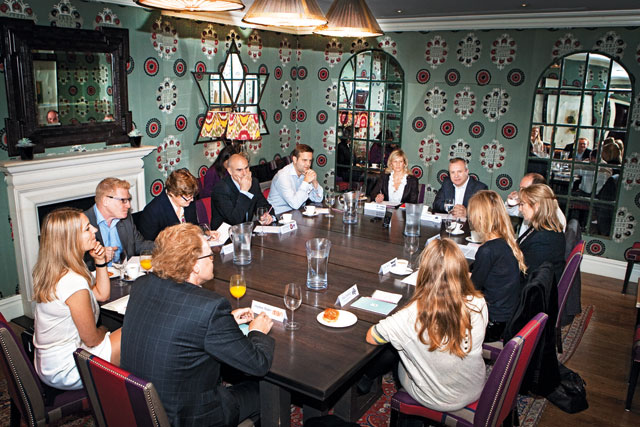Welcome to the first co-branded Marketing/Campaign Essays on Integration. The collection is a long-standing part of the Campaign portfolio which brings together advertising professionals to give their thoughts on how integration is developing.
As well as submitting individual essays, the participants took part in a roundtable debate on the nature of integration in marketing in 2012. This year's Essays on Integration include the client perspective as well as contributions from leading industry lights.
The debate included an eclectic mix of clients, agencies of various stripe, and even an academic. After enjoying a fortifying breakfast at London's Covent Garden Hotel, the tape started rolling.
At a time when channels to market and media options seem to expand by the day, there seems little doubt that clients want integration. Without a consistent framework within which to deliver campaigns, marketing efforts are doomed to ineffectiveness.
However, making it happen is tougher than willing it. Clients find it difficult to realise the promise of integration because they are too siloed, their agencies are not integrated, or the specialists don't talk to each other.

The recent demise of the agency Rapier, which was formed on an integrated proposition, also raised the question of what clients want in terms of integrated delivery.
But for some brands, integration begins at home, and sorting out their own organisation has been the first step to a more coherent communications policy. Virgin Media has spent the past year undergoing a painful process of internal integration, which brought three powerful departments - commercial strategy, brand and marketing, and customer loyalty - under the same umbrella.
Jeff Dodds, executive director of brand and marketing communications, Virgin Media, said: 'We were anything but integrated as a client and we had to converge into a single place where we had one contact talking to one contact.'
Virgin had been working with an integrated agency, but the process was not working. The company spends less than rivals Sky and BT and relies on out-thinking them, being creative and fast to market.
'We couldn't do it with a complicated process,' said Dodds. 'We were taking too long and not being creative enough.'
Since the bringing together of the three departments, the company is now more internally integrated and has gone back to working with specialist agencies, with BBH leading above the line.
'It's more straightforward - we know what they require and how to get them what they need,' Dodds said. 'We have moved from being a disparate client with an integrated agency model to being an integrated client with fragmented agency model.'
Stephen Maher, CEO, MBA, said that while organisations would make their own choice about how integration was delivered, there is no doubt its importance is growing. 'There is a debate about best in class versus a more holistic approach. What's changed is that digital means it all has to be integrated and you need an understanding of the digitally connected world.'
Another change is that there is a wider concept of what integration covers, said Alice Huntley, chief strategy officer, Rainey Kelly Campbell Roalfe/Y&R. 'There is an increased role for the lead agency to help the client come up with a clear vision of what is at the heart of the brand integrity. We like to talk about things that matter, not things that match.'

Consultation
Increasingly, agencies are challenged to come up with an agenda-setting idea that helps define the brand and can be used to communicate with all of its customers, both externally and internally.
For Littlewoods, St Luke's came up with the idea that it 'Brings the exciting feeling of new now', which was a dynamic statement for a company that saw itself as a credit organisation. This helped unlock a whole host of innovations that the marketing department could not have made happen alone. 'That's where integration has got to - the ability to simplify things and to be a real business tool,' said Neil Henderson, managing director of St Luke's.
Internal communications is now an important part of the integrated pitch. Annouchka Behrmann, regional director, Hill & Knowlton Strategies, said that internal customers had to be part of the communications plan. 'It's about interconnectedness. You can't have separate messages for internal and external audiences. That internal public can be incredibly powerful for brands.'
Employees are the brand's frontline, said Henderson: 'All brands are service brands now. You have to make it a personal interaction. You are trying to create a relationship with customers. That's the differentiation.'
With integration now covering all parts of the business, research by the University of Northampton into the stature of marketing has revealed a problem in implementing this broader definition.
Dr Kathleen Mortimer, associate professor, Northampton Business School, said that while marketers wanted integration, they were struggling to implement it due to declining influence at board level. 'It sounds great on paper, but there are so many touchpoints for the brand that it's hard to do: HR, manufacturing, operations - the whole organisation has to be in there for it to work.'
Antony Miller, marketing director, Royal Mail MarketReach, said an explicit focus on results from marketing would help get finance directors onside. 'The closer to the CFO at the beginning, the better. If the money is aligned, then the flow of activity is aligned and the ability to talk to partners is easier. If there is a financial bottleneck, integration fails on day one.'
A results focus also requires that marketers know which of their integrated channels are delivering, said Chris Sloane, partner at analytics firm Ohal. 'By knowing which levers work hardest, you can improve it going forward, but it's hard to do. From a measurement point of view, it would probably be great if there wasn't integration, but integrated campaigns tend to work harder.'
Maher said that with the data now available to marketers, agencies had to be financially literate and mechanistic to make the case to CEOs and CFOs.
Dodds agreed and said that the CMO of the future would be somebody with a solid grounding in data, statistics, econometrics and commercial strategy.
'You don't get to have the nice soft brand conversations unless you are commercially aware,' he said.
Also set to be tossed on the bonfire of the vanities is the notion of lead agency, said Miller. 'It is a dinosaur term. The lead agency for one task is the one who gets it at that time and may not be the same as the one for another. You can be lead agency for the quarter.'
Some smaller clients might still need them, said Mortimer. 'Sometimes they need help and that's where a lead agency comes in. It can help marketers sell in an idea to the board rather than having lots of agencies.'
Dodds said most clients don't care where ideas come from, but that agencies definitely do. 'There is a sense of hierarchy in the agency arena. It causes amazing angst among agencies when somebody else comes up with the idea and wants to run with it.'
However, Behrman said that this was because, on the occasion when a big idea didn't come from the ad agency, it still took the lead, something that disincentivises other agencies.
Such turf wars seem unlikely to dissipate anytime soon. However, there was a sense around the table that integration's time has come. It has moved out of the marketing textbooks and into the workplace at all levels. It can only grow in importance.

AT THE TABLE
Alice Huntley chief strategy officer, Rainey Kelly Campbell Roalfe/Y&R
Stephen Maher CEO, MBA
Annouchka Behrmann regional director, Hill & Knowlton Strategies
Antony Miller marketing director, Royal Mail MarketReach
Dr Kathleen Mortimer associate professor, University of Northampton, Northampton Business School
Jeff Dodds executive director of brand and marketing communications, Virgin Media
Chris Sloane partner, Ohal
Neil Henderson managing director and partner, St Luke's
Noelle McElhatton editor, Marketing
Claire Beale editor, Campaign
Suzanne Bidlake consultant editor, Marketing and Campaign
Stuart Derrick writer, Campaign.









